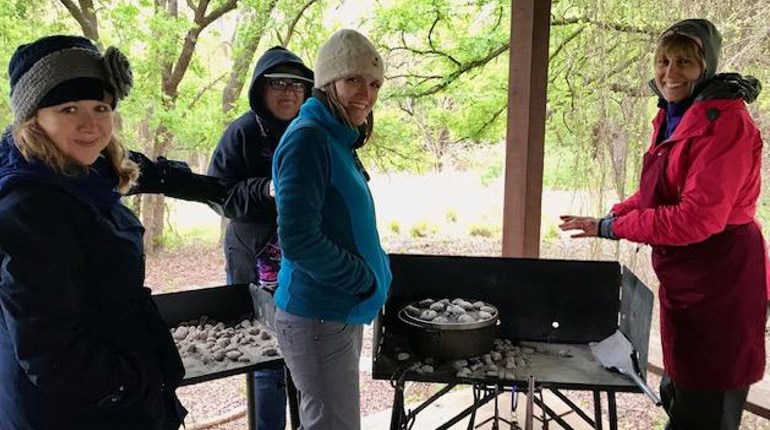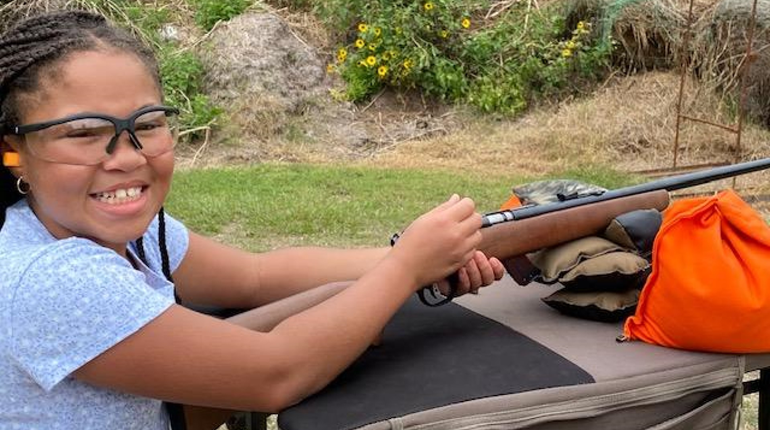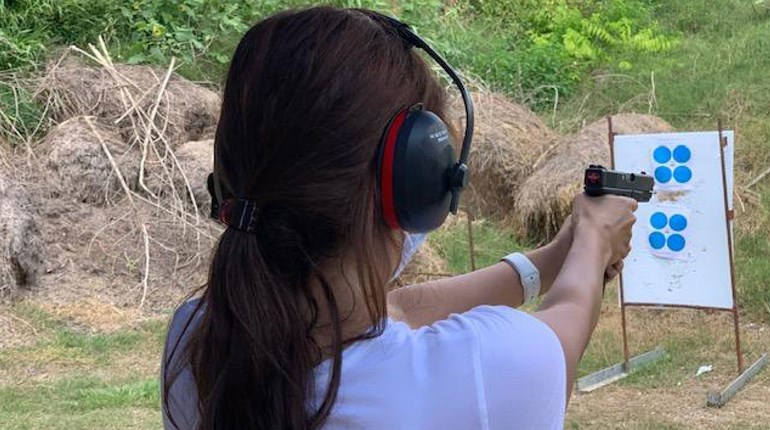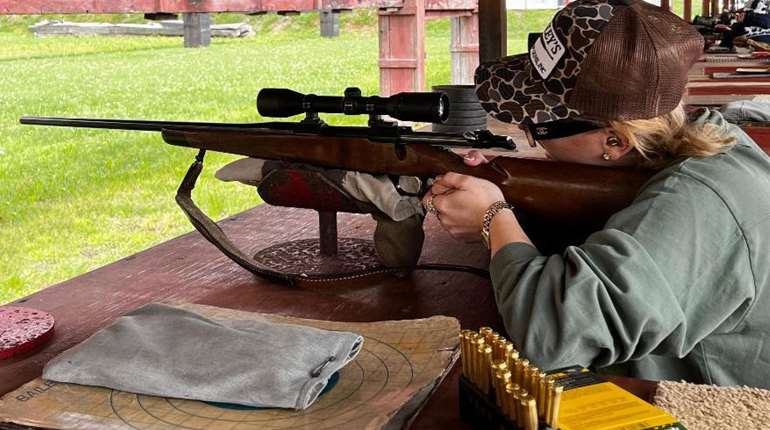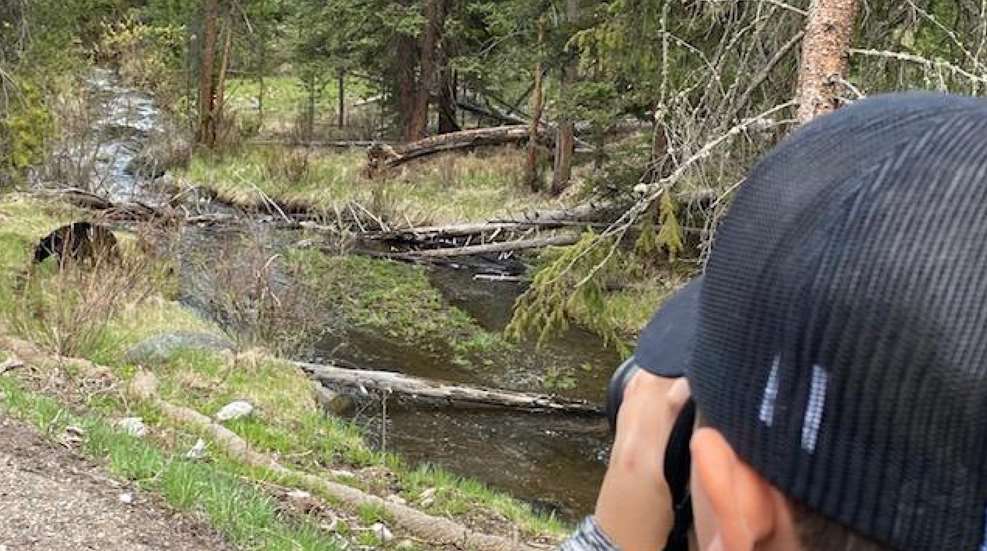
Large wildlife predator numbers are increasing throughout North America. The numbers of brown bears, black bears, mountain lions and wolves are increasing every year. At the same time, the number of sportsmen and women that venturing further into wildlife predator country are also increasing. That means deadly encounters between these large wildlife predators and humans are increasing. It is extremely important that sportsmen and women know how to handle game in the backcountry.
Always be on full alert when in the backcountry. Unless you are specifically hunting for one, never intentionally approach a large wildlife predator. When stalking game, be very aware of the possibility of surprising a wildlife predator. If you do surprise one, appear larger than life by waving your hands above your head while talking calmly and loudly, and slowly backing away. If you are hunting with a partner, stand side-by-side to make yourselves look even larger.
Carrying bear spray is highly recommended when in bear country. Make sure it is on your person and readily accessible if needed. Bear spray should be on your belt and never inside a day or backpack. Bear spray is easy to use and has proven to be effective in stopping bear, mountain lion and wolf attacks, or minimizing injuries when properly used at close range.
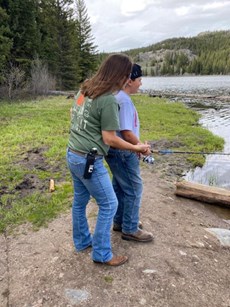
Fishing
There is nothing more relaxing than fishing in a cold mountain stream. There is also nothing more delicious than freshly caught trout! Unfortunately, we are not the only species that love the taste of trout. So do bears!
Be mindful of how you handle the fish you catch. The iconic image of the trout fisherman or woman with the wicker creel on their hips can get you in trouble. In essence you are trolling for bears as you walk the stream, focusing on making that perfect cast. An unsuspecting fisherman is an easy target for a hungry bear.
Caught fish should be placed on a stringer, away from where you are fishing and away from where you are camping. This allows any scent from the fish to attract a bear away from you. Additionally, fishermen and women that use creels bring it back to camp with them. This means that the scent of the trout that was in your creel is now in your camping area.
You should always clean your fish in the stream, before you head back to camp or your cooking area. The guts or any unusable parts should be removed from the fish and thrown in the middle of the stream where it is usually deepest and contains the fastest moving water.
Lastly, you should wash your hands and any fishing tackle in the stream. The slightest scent can bring a bear into your camp. If you do not plan on eating all your fish right then or have more fish that you can eat, you should leave the extra on a stringer in the stream. This stringer should be at least 100 yards from where you are camping.
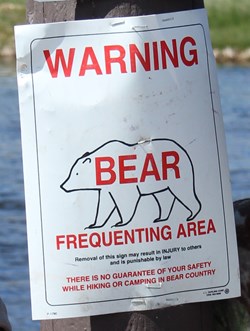
Hunting
The chances of encounters with large wildlife predators dramatically rise once you have successfully hunted and downed a large game animal. In most instances, you will be packing out your animal one large piece or quarter at a time. That means making multiple trips to and from the kill site, therefore increasing the risk of a bear conflict.
You should immediately move your kill away from any brushy areas and into an area that you can see large wildlife predators approaching. Next you should quickly quarter your game animal after the kill. You need to avoid opening the gut cavity, if possible, until after you have salvaged all other edible meat. Removing the hide first and avoiding the gut cavity will help limit additional odors. Be alert for bears that may be drawn to your kill site. Try to pack out all the meat in one trip if you are able. If not, place the remaining meat in game bags and hang them from a tree or collect them in an open area at least one hundred yards from the kill site. Leave the gut pile and the carcass for the bears.
If you cannot pack out all the meat at the same time after your remove the quarters, heavily flag the area with environmentally friendly or biodegradable materials to warn other hunters or hikers of the kill site. You may even place a tall stick with a flag to capture someone’s attention in the middle of the gut pile. This will not only alert anyone who approaches that area of the potential dangers of incoming bears, but it will also give you a visual indication of anything that may have disturbed your kill site as you return to the site for further loads of meat.
Approach these flagged areas with caution and continually be on the lookout for bears or other large wildlife predators. Make sure you remove any flagging tape that is not biodegradable on your last trip out of the area. While packing out game meat, continue to talk loudly, sing and make a lot of noise to announce your presence to any bears in the area. If you return to your kill site for another load of meat and find a bear has claimed it, do not try to drive the bear away. Not only will you provoke an attack, but your game meat has probably already been spoiled.
Once you have successfully packed out your meat and have returned to camp, make sure you store your meat a significant distance from your camp where you will be sleeping. All “smellables” should be at least 100 to 150 yards from your camp. If you are in an area that has many large wildlife predators, more distance may be required. Place any bloody clothes in a sealed plastic bag in the same location as your meat. Ideally, you want the meat and clothing to be far enough away from camp, but close enough for you to keep an eye on your items. The best situation is to hang meat in bear bags in trees at least fifteen feet above the ground. If there are no trees around, another alternative is to place items in a secured bear bag on top of a large boulder.
When hunting or camping in the backcountry in the extreme northern parts of North America, hanging a bear bag is not possible. Once you get above the timberline or are on the tundra, trees are very scarce. In this instance, gather all smellable items, including food, and take them as far away from camp as possible. Place the items on top of a large boulder if one is available. It is important to remember the need to get smellable items away from camp when picking a campsite. Campsites should be picked with the concept of bearproofing in mind.
When we venture into the backcountry, we do so to create special memories. We want them to be happy one. An encounter with a large wildlife predator can be deadly or result in serious injuries. These are not the memories we want to leave with our surviving family, friends and loved ones with. Stay safe and always be prepared!












